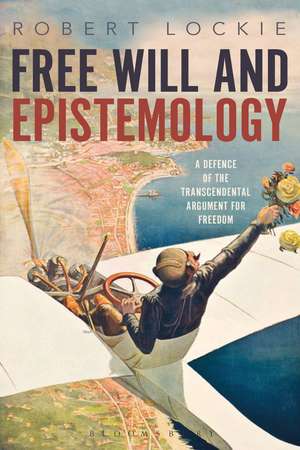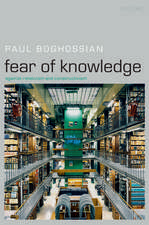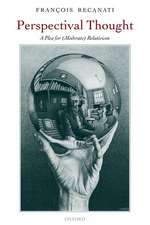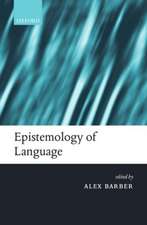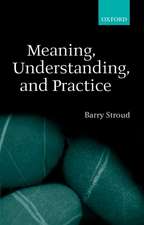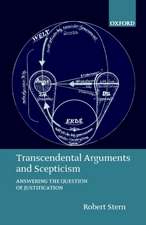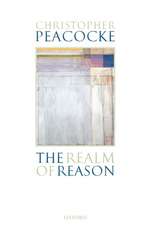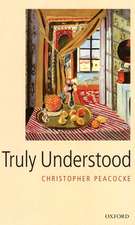Free Will and Epistemology: A Defence of the Transcendental Argument for Freedom
Autor Dr Robert Lockieen Limba Engleză Hardback – 10 ian 2018
| Toate formatele și edițiile | Preț | Express |
|---|---|---|
| Paperback (1) | 232.90 lei 6-8 săpt. | |
| Bloomsbury Publishing – mai 2019 | 232.90 lei 6-8 săpt. | |
| Hardback (1) | 775.51 lei 6-8 săpt. | |
| Bloomsbury Publishing – 10 ian 2018 | 775.51 lei 6-8 săpt. |
Preț: 775.51 lei
Preț vechi: 1113.92 lei
-30% Nou
Puncte Express: 1163
Preț estimativ în valută:
148.41€ • 154.00$ • 124.05£
148.41€ • 154.00$ • 124.05£
Carte tipărită la comandă
Livrare economică 18 martie-01 aprilie
Preluare comenzi: 021 569.72.76
Specificații
ISBN-13: 9781350029040
ISBN-10: 1350029041
Pagini: 320
Dimensiuni: 156 x 234 x 25 mm
Greutate: 0.62 kg
Editura: Bloomsbury Publishing
Colecția Bloomsbury Academic
Locul publicării:London, United Kingdom
ISBN-10: 1350029041
Pagini: 320
Dimensiuni: 156 x 234 x 25 mm
Greutate: 0.62 kg
Editura: Bloomsbury Publishing
Colecția Bloomsbury Academic
Locul publicării:London, United Kingdom
Caracteristici
Uses ideas about justification and rationality to defend a modern version of the transcendental argument for free will
Notă biografică
Robert Lockie is Senior Lecturer in the School of Human and Social Sciences at the University of West London, UK.
Cuprins
Introduction Part I: Justification1. Internalism as a Thin Deontological Concept 2. The Regulative and the Theoretical 3. Epistemic Deontologism & Control 4. Epistemic Agency and Executive Control 5. The Ineliminability of Internalism Part II: Freedom6. Ought Implies Can 7. The Lazy Argument 8. Transcendental Arguments for Freedom I 9. Self-determination and Determination by Reasons 10. Transcendental Arguments for Freedom IIBibliographyIndex
Recenzii
Lockie presents a thorough, nuanced argument for a (somewhat) commonsense and intuitive theory of moral agency and freedom . Summing Up: Recommended. Graduate students, researchers, faculty.
Lockie deserves praise for connecting the topics of epistemology and free will in a clear and thoughtful way ... Even more importantly, Lockie's book persuasively shows the intimate connection between deontic internalism and Libertarianism. If they are so closely related to each other, Lockie provides one of the strongest reasons in the literature for embracing Libertarian free will.
[A] splendid book ... I hope the book will become a future classic in the discussion of free will.
Lockie's book is a strikingly original exercise in philosophical ressourcement: refurbishing ancient philosophical theses and arguments and bringing them into conversation with predominant contemporary positions. Lockie provides linked transcendental arguments regarding the nature of our cognitive and practical agency, in favor of deontic epistemic internalism and metaphysical libertarianism. It is argued with care and style. The smart and informed critical perspective Lockie brings is a most useful stimulus, at minimum, to recognize afresh the uncertain basis of prevailing research programs - and perhaps to re-think them entirely.
In a brilliant demonstration of the continued relevance and unceasing attractions of broad-minded analytical philosophy, Lockie's book offers a fresh take on a classical style of argument - variously referred to as peritrope, Epicurean, reversal, self-refutation or transcendental - that has exercised the minds of philosophers and philosophically-minded laymen since Antiquity. In the free will debate, the argument advanced is that the denial of free will cannot be stated without that denial undermining itself. The book infuses new life into this unjustly neglected idea providing what is perhaps its most rigorous and systematic formulation to date. As such, Lockie's work is compulsory reading for all those specializing in the philosophy of free will. It will also be eminently useful to anyone interested more broadly in transcendental arguments as well as the epistemology of self-contradiction and justification.
The fundamental aim of Lockie's Free Will and Epistemology is to provide a transcendental argument for libertarian free will. The basis of this argument is that we can never be epistemically justified in undermining a strong notion of free will because any claim of this kind is itself justified only if we presuppose a strong notion of free will. The general argument advanced is both ambitious and rigorously presented. Lockie's book is challenging and wide-ranging and makes a significant and valuable contribution to the debate.
Free Will and Epistemology would make a nice addition for both an upper division undergraduate course as well as a graduate level course. Indeed, I would recommend it highly for anyone who is about to enter graduate school and interested in the two main topics, as well as scholars in both fields.
Lockie deserves praise for connecting the topics of epistemology and free will in a clear and thoughtful way ... Even more importantly, Lockie's book persuasively shows the intimate connection between deontic internalism and Libertarianism. If they are so closely related to each other, Lockie provides one of the strongest reasons in the literature for embracing Libertarian free will.
[A] splendid book ... I hope the book will become a future classic in the discussion of free will.
Lockie's book is a strikingly original exercise in philosophical ressourcement: refurbishing ancient philosophical theses and arguments and bringing them into conversation with predominant contemporary positions. Lockie provides linked transcendental arguments regarding the nature of our cognitive and practical agency, in favor of deontic epistemic internalism and metaphysical libertarianism. It is argued with care and style. The smart and informed critical perspective Lockie brings is a most useful stimulus, at minimum, to recognize afresh the uncertain basis of prevailing research programs - and perhaps to re-think them entirely.
In a brilliant demonstration of the continued relevance and unceasing attractions of broad-minded analytical philosophy, Lockie's book offers a fresh take on a classical style of argument - variously referred to as peritrope, Epicurean, reversal, self-refutation or transcendental - that has exercised the minds of philosophers and philosophically-minded laymen since Antiquity. In the free will debate, the argument advanced is that the denial of free will cannot be stated without that denial undermining itself. The book infuses new life into this unjustly neglected idea providing what is perhaps its most rigorous and systematic formulation to date. As such, Lockie's work is compulsory reading for all those specializing in the philosophy of free will. It will also be eminently useful to anyone interested more broadly in transcendental arguments as well as the epistemology of self-contradiction and justification.
The fundamental aim of Lockie's Free Will and Epistemology is to provide a transcendental argument for libertarian free will. The basis of this argument is that we can never be epistemically justified in undermining a strong notion of free will because any claim of this kind is itself justified only if we presuppose a strong notion of free will. The general argument advanced is both ambitious and rigorously presented. Lockie's book is challenging and wide-ranging and makes a significant and valuable contribution to the debate.
Free Will and Epistemology would make a nice addition for both an upper division undergraduate course as well as a graduate level course. Indeed, I would recommend it highly for anyone who is about to enter graduate school and interested in the two main topics, as well as scholars in both fields.
